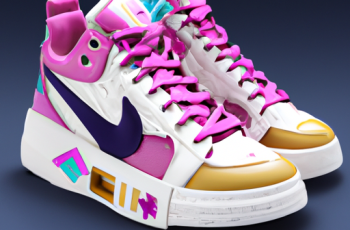Get ready to step into a greener future as we explore the fascinating world of sustainability in the chunky sneaker industry. In this article, we will uncover how eco-friendly materials and practices are revolutionizing the sneaker game, paving the way for a more environmentally conscious fashion industry. From innovative materials derived from plant-based sources to ethical manufacturing processes, get ready to discover how your favorite chunky sneakers can make a positive impact on the planet without sacrificing style. So lace up your shoes and join us on this eco-friendly journey.

Introduction
Welcome to the world of sustainable sneakers! In recent years, there has been a growing concern for sustainability in all aspects of our lives, including the fashion industry. Sneaker production, in particular, has come under scrutiny due to its significant environmental impact. However, with the rise of sustainable fashion and a shift towards eco-friendly materials and practices, the chunky sneaker industry is now at the forefront of the sustainability movement. In this article, we will explore the various aspects of sustainability in the chunky sneaker industry, including eco-friendly materials, sustainable manufacturing practices, circular economy initiatives, brand collaborations, transparent supply chains, consumer education, and the challenges and opportunities that lie ahead. So get ready to discover how you can make a style statement while also protecting our planet!
1. Growing Concerns for Sustainability
1.1 Environmental Impact of Sneaker Production
Sneaker production takes a toll on the environment through various aspects of the manufacturing process. From the extraction and processing of raw materials to the energy-intensive production methods and the disposal of waste, the environmental footprint of sneakers is significant. The constant demand for new releases and fast-fashion trends has only exacerbated this issue, leading to concerns about the depletion of natural resources, water pollution, greenhouse gas emissions, and the accumulation of non-biodegradable waste. It is crucial to address these concerns and find sustainable alternatives to minimize the impact on our planet.
1.2 Rise of Sustainable Fashion
The rise of sustainable fashion has been a game-changer in the industry, encouraging brands to prioritize eco-friendly practices and materials. Consumers are now more aware and conscious of the environmental and social implications of their fashion choices. This shift in consumer mindset has pushed brands to adopt sustainable practices and develop products that meet the demands of conscious consumers. The chunky sneaker industry has embraced this trend, recognizing the need to incorporate sustainability into their designs and manufacturing processes.
1.3 Chunky Sneaker Trend
In recent years, chunky sneakers have become a major fashion trend, with celebrities, influencers, and fashion enthusiasts alike embracing their unique and bold aesthetic. This trend has presented both an opportunity and a challenge for the sustainable sneaker industry. On one hand, the popularity of chunky sneakers has allowed sustainable brands to showcase their environmentally-friendly designs to a wider audience. On the other hand, meeting the demand for trendy and sustainable chunky sneakers requires innovative solutions and a balance between fashion and sustainability.
2. Eco-Friendly Materials
2.1 Organic Cotton
Organic cotton is one of the most popular eco-friendly materials used in the production of sustainable sneakers. Unlike conventional cotton, which relies heavily on pesticides and synthetic fertilizers, organic cotton is grown without the use of harmful chemicals. This not only reduces the environmental impact but also ensures that the cotton farmers are not exposed to hazardous substances. By choosing sneakers made from organic cotton, you can support sustainable farming practices and contribute to a healthier and greener fashion industry.
2.2 Recycled Polyester
Recycled polyester is another sustainable material that is gaining popularity in the chunky sneaker industry. By using recycled plastic bottles and other post-consumer materials, brands can reduce the amount of waste going into landfills and minimize the reliance on virgin polyester production. Recycled polyester offers the same performance as virgin polyester while significantly reducing the carbon footprint of the sneaker manufacturing process. So next time you lace up a pair of chunky sneakers made from recycled polyester, you can take pride in knowing that you are helping to give plastic waste a second life.
2.3 Plant-Based Alternatives
Plant-based alternatives, such as pineapple leather (Piñatex) and mushroom leather (Muskin), are innovative materials that offer a sustainable and cruelty-free option for sneakers. Piñatex is made from the fibers of pineapple leaves, a byproduct of the pineapple harvest. It provides a durable and versatile material that can be used as a leather alternative. Similarly, Muskin is derived from mushroom caps and offers a natural, breathable, and biodegradable alternative to animal leather. By opting for sneakers made from plant-based materials, you can contribute to reducing the demand for animal products and promote sustainable innovation in the fashion industry.
2.4 Sustainable Leather
While the use of animal leather is traditionally associated with environmental and ethical concerns, sustainable leather options aim to address these issues. Brands are now exploring more responsible sourcing practices, such as sourcing leather from regenerative farms or utilizing byproducts from the food industry. Additionally, vegetable tanning techniques, which utilize natural substances instead of harmful chemicals, are being adopted to minimize environmental harm. Sustainable leather provides a more conscious choice for those who still appreciate the unique qualities of leather but want to support more ethical and sustainable practices.
2.5 Biodegradable Materials
Innovations in biodegradable materials have opened up exciting possibilities for sustainable sneakers. These materials are designed to break down naturally and return to the environment, minimizing waste and reducing the impact of sneaker production. Some biodegradable options include bioplastic made from plant starches, compostable fabrics, and natural rubber. By choosing sneakers made from biodegradable materials, you can help reduce the burden on landfills and contribute to a more circular and sustainable economy.
3. Sustainable Manufacturing Practices
3.1 Reduced Water Consumption
Water is a precious resource, and the sneaker industry consumes a significant amount of it throughout the production process. Sustainable brands are striving to reduce water consumption by implementing innovative technologies like closed-loop systems and waterless dyeing techniques. These methods not only conserve water but also minimize water pollution by eliminating the need for harmful chemicals. By supporting brands that prioritize water conservation, you can contribute to safeguarding this vital resource.
3.2 Energy-Efficient Production
Energy-efficient production is another important aspect of sustainable manufacturing practices in the chunky sneaker industry. Brands are investing in renewable energy sources and optimizing their production processes to minimize carbon emissions. By using solar and wind energy or by improving energy management systems, brands can significantly reduce their carbon footprint. So, when you choose sneakers from brands that prioritize energy efficiency, you are supporting the transition to clean and sustainable energy sources.
3.3 Waste Reduction and Recycling
Minimizing waste and promoting recycling are crucial steps towards a more sustainable sneaker industry. Brands are adopting various waste reduction strategies, such as sourcing materials with minimal waste generation, implementing efficient production techniques, and recycling or repurposing waste materials. Additionally, some brands offer take-back programs where old sneakers can be returned and recycled into new products. By supporting brands that prioritize waste reduction and recycling, you can contribute to a more circular and less wasteful fashion industry.
3.4 Fair Labor Practices
Ethical manufacturing practices are essential for the sustainability of the chunky sneaker industry. Brands are increasingly committed to ensuring fair labor practices throughout their supply chains. This includes providing safe working conditions, fair wages, and protecting workers’ rights. Some brands even partner with social impact organizations to support workers’ communities and create positive change. By choosing sneakers from brands that prioritize fair labor practices, you can help create a more just and sustainable fashion industry.

4. Circular Economy and Extended Product Lifecycles
4.1 Designing for Durability
Designing sneakers for durability is a key strategy in prolonging their lifespan and reducing waste. Sustainable brands focus on quality construction and materials that can withstand extended use. By investing in well-made, durable sneakers, you can reduce the frequency of replacements and contribute to a more sustainable fashion industry. Additionally, choosing timeless designs over fast-fashion trends ensures that your sneakers remain stylish and wearable for years to come.
4.2 Repair and Resole Programs
Repair and resole programs offered by some brands are a great way to extend the lifespan of your sneakers. Instead of discarding sneakers with minor damage, you can have them repaired or resoled, saving them from ending up in landfills. Brands that offer these programs often have dedicated repair centers or partner with local cobblers to provide these services. By taking advantage of repair and resole programs, you can reduce waste and give your sneakers a new lease on life.
4.3 Recyclable and Upcyclable Sneakers
The concept of circularity is gaining momentum in the sustainable sneaker industry. Brands are designing sneakers with recyclable or upcyclable materials, making it easier to close the loop and minimize waste. Some brands even offer recycling programs where old sneakers can be returned and transformed into new products, reducing reliance on virgin materials. By opting for recyclable or upcyclable sneakers, you can actively participate in the circular economy and contribute to a more sustainable fashion industry.
5. Brand Initiatives and Collaborations
5.1 Adidas: Parley for the Oceans
Adidas has been at the forefront of sustainable initiatives with its partnership with Parley for the Oceans. This collaboration aims to reduce plastic waste in the oceans by transforming it into performance sportswear, including chunky sneakers. The sneakers are made partially from recycled ocean plastic, demonstrating that sustainability and style can go hand in hand. By supporting this collaboration, you not only enjoy fashionable and eco-friendly sneakers but also contribute to the cleanup of our oceans.
5.2 Nike: Move to Zero
Nike’s Move to Zero initiative represents its commitment to zero carbon and zero waste. The brand aims to achieve these goals by using sustainable materials, minimizing waste, and reducing its carbon footprint. Nike’s focus on innovation and sustainable practices has resulted in the development of eco-friendly sneakers, including chunky designs. By supporting Nike’s Move to Zero initiative, you can be part of the push towards a more sustainable future.
5.3 Reebok: Cotton + Corn Initiative
Reebok’s Cotton + Corn initiative emphasizes the use of plant-based materials in their sneakers. The brand is dedicated to creating shoes made from sustainable cotton and corn-derived materials that can be easily composted at the end of their life cycle. Through this initiative, Reebok aims to minimize waste and promote a more circular economy. By choosing sneakers from the Cotton + Corn collection, you can contribute to reducing the environmental impact of the sneaker industry.

6. Transparent Supply Chains and Certifications
6.1 Supply Chain Traceability
Transparency in supply chains is essential for ensuring sustainability and ethical practices. Conscious consumers are increasingly demanding visibility into the sourcing and production processes of their favorite brands. Brands that prioritize supply chain traceability provide detailed information about the origin of materials, manufacturing processes, and labor conditions. By supporting brands with transparent supply chains, you can make informed choices and promote greater accountability in the chunky sneaker industry.
6.2 Certifications and Standards
Certifications and standards play a crucial role in verifying the sustainability claims of brands. Look for certifications such as the Global Organic Textile Standard (GOTS), the Forest Stewardship Council (FSC) certification for sustainable leather, or the Recycled Claim Standard (RCS) for recycled materials. These certifications ensure that the products meet specific sustainability criteria and give consumers confidence in their purchasing decisions. By choosing sneakers with recognized certifications and standards, you can support brands that adhere to the highest sustainability standards.
7. Consumer Education and Awareness
7.1 Sustainability Awareness Campaigns
Consumer education and awareness campaigns are vital in driving the sustainability movement in the chunky sneaker industry. These campaigns aim to educate consumers about the environmental and social impact of their fashion choices and highlight the importance of sustainable alternatives. Brands, organizations, and influencers collaborate to spread the message of sustainability through social media, events, and collaborations. By staying informed and participating in these campaigns, you can contribute to raising awareness and making sustainable choices easier for everyone.
7.2 Ethical Consumerism
Ethical consumerism is a growing trend that encourages consumers to consider the ethical implications of their purchases. By prioritizing the purchase of sustainable and ethically produced sneakers, you can support brands that align with your values. This includes considering the materials, manufacturing practices, and overall sustainability efforts of the brand. Ethical consumerism empowers individuals to vote with their wallets and drive positive change in the chunky sneaker industry.
7.3 Making Informed Choices
Making informed choices is essential in promoting sustainability in the chunky sneaker industry. Take the time to research brands’ sustainability initiatives, materials used, and their overall commitment to eco-friendly practices. Look for transparency in their communication and consider the certifications and standards they adhere to. By taking a proactive approach to your sneaker purchases, you can make a positive impact and support brands that prioritize sustainability.
8. Challenges and Opportunities
8.1 Balancing Sustainability with Fashion Trends
One of the significant challenges for the sustainable chunky sneaker industry is balancing sustainability with ever-changing fashion trends. While sustainability should be at the core of the industry, it is essential to cater to consumer demands and preferences for trendy designs. Finding innovative ways to incorporate sustainable materials and practices into fashionable sneakers is an ongoing challenge and opportunity for brands. By supporting brands that strike a balance between sustainability and style, you can contribute to shaping the future of sustainable fashion.
8.2 Scaling Up Sustainable Practices
Scaling up sustainable practices is another challenge that the chunky sneaker industry faces. As demand for eco-friendly sneakers grows, brands need to ensure that they can meet this demand without compromising sustainability standards. This involves investing in research and development, expanding production capacity for sustainable materials, and continuously improving manufacturing processes. By supporting brands that are committed to scaling up sustainable practices, you can encourage the industry to prioritize and expand eco-friendly options.
8.3 Accessible Pricing
Accessible pricing is a barrier that needs to be addressed to make sustainable sneakers more widely available. Sustainable materials and practices often come at a higher cost, making eco-friendly sneakers less accessible to all consumers. Brands and consumers need to work together to find solutions that balance sustainability with affordability. By supporting brands that offer sustainable options at more accessible price points, you can contribute to democratizing sustainable fashion and making it a viable choice for everyone.
9. Conclusion
In conclusion, sustainability in the chunky sneaker industry is no longer just a trend – it is a necessity. Brands are increasingly embracing eco-friendly materials, implementing sustainable manufacturing practices, and collaborating to drive positive change. As consumers, we have the power to make a difference by choosing sneakers made from sustainable materials, supporting brands with transparent supply chains, and participating in consumer education and awareness campaigns. By making informed choices and prioritizing the planet in our purchases, we can enjoy the style and comfort of chunky sneakers while also protecting the environment and contributing to a more sustainable future for the fashion industry. So lace up your sustainable sneakers and join the movement towards a greener and more fashionable world!


